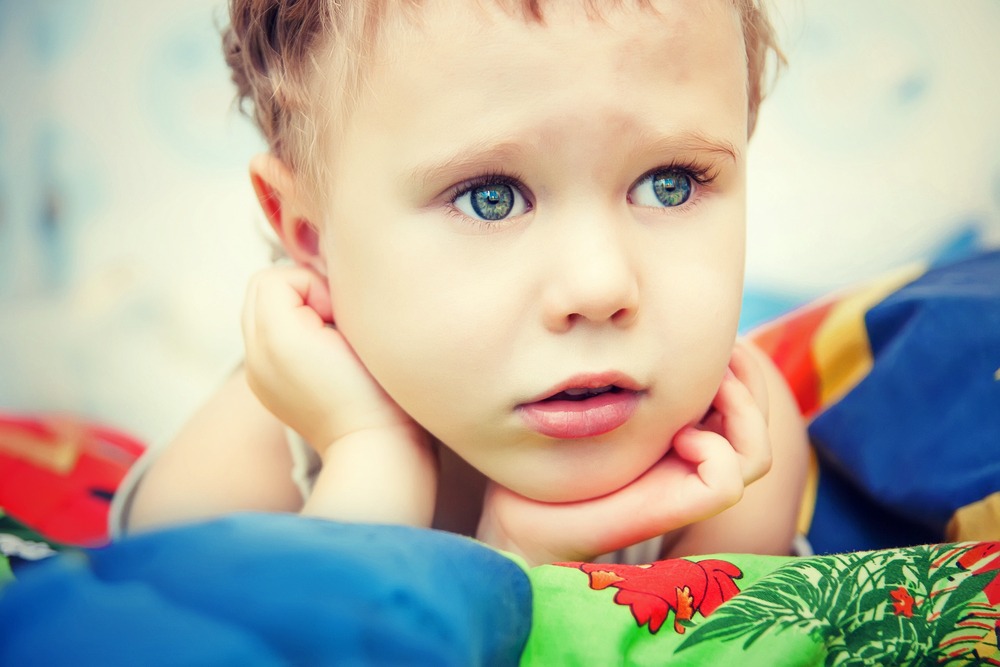What are the signs of an anxious toddler? Many parents will miss the early signs of toddler anxiety, as it can often look vastly different than what we might expect. There are the obvious signs of toddler anxiety such as excessive fears and phobias, but there are also more subtle signs that indicate an anxious personality. Some early precursors to anxiety are often seen in behavioral and sensory issues.
Below are 10 common signs of an anxious toddler:
-
Fears and Phobias
First, let’s address the most obvious sign of toddler anxiety – fears and phobias. Toddlers with an anxious personality tend to be more fearful than the average toddler. Typical toddlers can also exhibit some of these fears, but it is the level of fear that sometimes differentiates the anxious toddler from the non-anxious toddler. The most common toddler fears are centered around a few basic themes:
• Bugs, birds and animals
• Shadows and the dark
• Monsters, creatures and dinosaurs
• Bathroom fears (Fear of getting flushed down the toilet, of bugs or of the flush)
• Bathtub fears (Fear of getting swallowed by the drain, bugs in bath or of water)This is not an exhaustive list, but highlights the most common toddler fears you might encounter with your little one.
-
Rigidity in Routine
All toddlers love routine and structure, but anxious toddlers cannot survive without it! Anxious toddlers need to have their day planned out in a very predictable fashion. If plans suddenly change, these children become completely unglued. Anxious children cannot handle change or transitions and they will often become unraveled when simple changes are made to their daily routine.
-
Sensitivity to Noises
Anxious toddlers are more likely to have heightened sensitivities. They are often more startled by noises in their environment. They might be afraid of loud sounds such as the vacuum, garbage disposal, garbage truck, automatic toilet flushers and loud music.
-
Sensitivity to Clothes
Besides noises, anxious children might start to have issues with their clothes. Often anxious toddlers have trouble with seams on their socks and tags on their clothes. Some children prefer to wear crocs or flip flops. Some anxious toddlers refuse to wear jeans or clothes that feel restricting on their body.
-
Doesn’t like to get Hands Dirty
Some anxious toddlers are very concerned with getting dirty – especially their hands. Anxious toddlers often avoid messy play and they may have a mini-meltdown if their hands get overly dirty. They will often insist on washing their hands when their hands have anything on them.
-
Has Many Rituals
Anxious toddlers have many routines, that border on ritualistic behavior. They may only want to use certain dishes or they may insist that you serve food to them in a certain way (cut it in triangles). They might have bedtime routines that require you to line up their stuffed animals in a certain way or require you to say good night to them in a certain way. They might have you re-do things because it wasn’t done in the correct order or in the correct way.
-
Picky Eater
Most toddlers are picky eaters. Food is a common toddler battle. The anxious toddler takes picky eating to another level! Anxious children are less likely to try any new foods at all. They may not want their food touching on their plate. Some anxious toddlers gag when their food has textures they are not expecting. Anxious toddlers might have less than a handful of foods that they will eat.
-
Toddler Follows you From Room to Room
The anxious toddler is a parent’s shadow. Many toddlers will follow their parent around the house, but the anxious toddler will have a complete meltdown if they cannot see their parent. These children are right under their parent’s feet and cry and hover around the door when their parent’s in the bathroom. Any type of separation is a cause for panic for the anxious toddler.
-
Slow to Warm
Anxious toddlers are less likely to be friendly to strangers. They are more likely to be leg huggers and may take some time to warm up to new people in their life. Some anxious toddlers might be overwhelmed in crowds or at busy birthday parties where there are many children around.
-
Sleep Issues
Anxious toddlers almost always have sleep issues. They have a hard time sleeping on their own and want their parent to lie down with them or sleep with them at night. They might get up several times a night because they are scared or had a bad dream.
Some anxious toddlers might have all ten of these qualities and others might only have a few. Every child is unique and anxiety can manifest in different ways for different children. The good news is the earlier you detect anxiety in your child, the quicker you can learn approaches to help build their level of resiliency and teach them coping mechanisms to overcome these challenges.

About the Author: Natasha Daniels
Natasha is a Child Therapist and a mother to three vibrant, challenging and insightful children who keep her on her toes! She created her website, Anxious Toddlers, to offer support, guidance and laughs to parents of toddlers. She has spent the last fifteen years working with toddlers in her practice and helping families with parenting issues at Hill Child Counseling – ‘Sometimes toddlers can feel like a different species and I hope to help unlock the mystery of how to keep your little one smiling, laughing and enjoying the moment one day at a time.’
Natasha is a Clinical Social Worker and she received her post-graduate training in infant and toddler mental health at The Harris Institute. She is one of only a handful of child therapists who offer a specialty in toddler mental health and who has a practice that offers counseling to families on toddler parenting issues.
She spends half her week in her practice and the other half of her week soaking up the innocence of her children and enjoying the simpler things in life.
Her book How to Parent Your Anxious Toddler is available at all major book stores or it can be purchased directly from Jessica Kingsley Publishers.
You can find Natasha at her website, Anxious Toddlers, on Facebook, Pinterest, Twitter, Instagram, or making parenting videos for Curious.com.



My daughter exhibited all these traits. She was later diagnosed with Asperger’s syndrome.